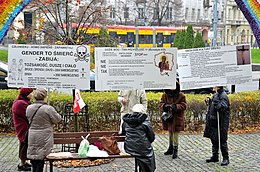
Back الحركة المناهضة للنوع الاجتماعي Arabic Antigenderové hnutí Czech Anti-Gender-Bewegung German Movimiento antigénero Spanish Anti-gender-liike Finnish Antirodni pokret Croatian Հակագենդերային շարժում HY 反ジェンダー運動 Japanese 반젠더 운동 Korean Anti-genderbeweging Dutch

| Part of a series on |
| Transgender topics |
|---|

The anti-gender movement is a global phenomenon that opposes concepts often referred to as "gender ideology" or "gender theory." These terms lack a clear, consistent definition but are commonly used by the movement to critique a range of issues related to gender equality, LGBT rights, and gender studies. Originating in the late 20th century, the movement has drawn support from far-right and right-wing populist groups, conservative religious organizations, and social conservatives worldwide. It views advances in gender inclusion and LGBT rights as threats to traditional family structures, religious values, and established social norms.
The movement has been criticized for promoting discrimination and undermining human rights protections, particularly those concerning individuals with diverse gender identities and sexual orientations. Critics argue that it employs misinformation to delegitimize efforts toward gender inclusion and has been described as a form of moral panic or conspiracy theory. International bodies, including UN Women, classify it as an extreme anti-rights movement that "use[s] hateful propaganda and disinformation". The Canadian Security Intelligence Service has noted its potential to incite "extreme violence" against LGBT communities. Increasingly, the movement aligns with far-right populism, religious conservatism, and trans-exclusionary radical feminism or gender-critical feminism.
Operating on a transnational scale, the anti-gender movement employs strategies such as political lobbying, public protests, and legislative initiatives to resist policies promoting gender equality and LGBT inclusion. Its opposition targets various domains, including reproductive rights, government-led gender policies, gender mainstreaming (the integration of gender perspectives into public policy), and academic disciplines like gender studies. While some elements within the movement focus specifically on opposing certain LGBT rights, others address broader concerns about gender-related social changes.
Scholars have highlighted the movement's distinctive nature compared to traditional forms of anti-feminism. Andrea Pető describes it as a "fundamentally new phenomenon" aimed at reshaping global sociopolitical orders.[1] Academics such as Stefanie Mayer and Birgit Sauer characterize the term "gender ideology" as an empty signifier, a flexible label used to oppose progressive gender policies. Agnieszka Graff describes it as a catch-all term for issues disfavored by conservative Catholic groups.